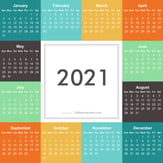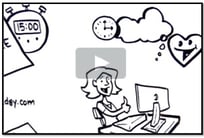Guest blog article by Rick Colosimo
 Besides profiling a few prolific users and an "Odd Couple" married couple, complete with female Oscar, with photos, emails, audio, and video adding up to vast amounts of digital storage space, there is a list of a handful of "tell-tale" signs. Signs of digital hoarding include: using all your free space on gmail; a desktop cluttered with icons; digital photos that are mostly bad; and TV shows you don't plan to watch. Suggested "treatments" include: Inbox Zero (made famous by Merlin Mann of 43folders); declaring email bankruptcy; and reducing inflow to your email inbox.
Besides profiling a few prolific users and an "Odd Couple" married couple, complete with female Oscar, with photos, emails, audio, and video adding up to vast amounts of digital storage space, there is a list of a handful of "tell-tale" signs. Signs of digital hoarding include: using all your free space on gmail; a desktop cluttered with icons; digital photos that are mostly bad; and TV shows you don't plan to watch. Suggested "treatments" include: Inbox Zero (made famous by Merlin Mann of 43folders); declaring email bankruptcy; and reducing inflow to your email inbox.
The real kernel of where this article meant to go is one of the signs that is ignored in the text: "Deleting anything makes you anxious -- even things you can't remember why you saved." Digital storage, by itself, is in a different category than physical hoarding because of the inherent cost-benefit analysis. With no physical outcomes, other than costs for a 2TB hard drive (<$200) every so often, it's hard to compare keeping emails with a pile of old unread newspapers. Certainly, the filing vs piling debate makes the "cost" of storing more even lower -- the generally accepted answer these days is that it's faster to search than maintain a detailed filing system. The search costs go down more than expected because you don't have to search for everything you store, but you have to file everything to have a filing system.
I think the critical distinction is one of attitude and anxiety: if you are anxious, you have a problem regardless of whether you have 100 photos or 100,000. If you search and can't find things, that's a different problem with a specific solution for your situation to create total organization. I find that Quicksilver and Spotlight do quite well at finding things quickly for me with little worries on my part.
Take a quick look at your primary machine (OmniDiskSweeper is a free lightweight simple sizing tool): how much do you have in various folders? After doing some cleaning myself, it reports:
-
iTunes (Includes Stanford IOS course in HD and music videos): 50gb
-
Documents (includes archived client files and backups as well as my second copy of most mail since I have Outlook for Mac installed too): 26.6 gb
-
Pictures: 16.9 gb
-
Library (a Mac folder that stores mail, working folders for DevonThink, and IOS backups): 14.3 gb
-
Downloads (all my "temp" storage plus working files for learning how to program): 4.2 gb
-
All that plus the miscellaneous leaves me with plenty of space on a 256gb solid-state macbook air.
NB: To be fair, I've offloaded 10gb of old Windows PST files to my time capsule, and about 6gb of tutorial videos for Rails/IOS as well. Much of my old music (about 60gb) resides on my still-running Windows Vista desktop on a 500gb hard drive.
What's your digital storage profile look like? What tools do you use to find things easily?








